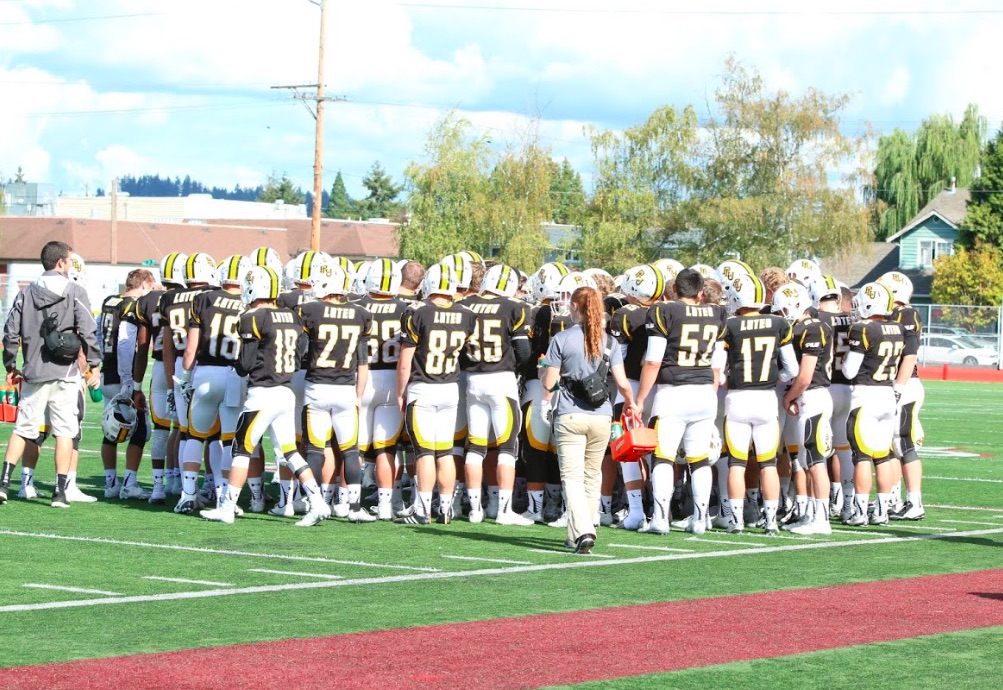COURTNEY MIRANDA; News Editor; mirandcs@plu.edu
Editor’s Note: After reaching out several times to comment, Acting President Allan Belton, along with other members of the Pacific Lutheran University administration and Student Life office did not respond after several requests for comment. Additionally, we reached out to the Football Alumni Service Team (FAST) and the Westering family, who both declined to comment. We also contacted Vice President for Advancement Dan Lee who did not respond after several requests for comment.
Former head football coach Scott Westering announced a controversial resignation last November, ending his 14 season career at Pacific Lutheran University. Much speculation surfaced claiming that Westering parted ways due to long-time ideological differences between him and the administration.
On the day of Westering’s resignation, an administrative conglomerate comprised of PLU Athletic Director Laurie Turner, Associate Director of Athletics Jen Thomas, acting President Allan Belton, Assistant Vice President Joanna Royce-Davis and Assistant football coach Jud Keim met with the team to announce the news.
At the forum, the football players were permitted to ask questions in an attempt to gain clarity about the resignation. The news was met with immediate skepticism, anger and confusion by the team. Many expressed the belief that Westering was forced to resign, as an unexpected resignation seemed to be out of character for their longtime coach.
“At the end of the day, he made the choice to resign,” senior and captain Travis McMillion said. “But I think that it was indeed forced upon him and I think he was blindsided, in the sense that he went to work that morning having no intentions of resigning.”
The players expressed frustrations about the handling of the news itself, finding the administration’s actions to lack transparency.
“I mean it’s your athletic department, if you want to get rid of somebody, do it, it’s your prerogative to do so,” senior Jacob King said. “I think they honestly thought they could kind of outsmart us, they thought we would just roll over.”
Turner explained that despite the speculation of a forced resignation, Westering made the decision to resign.
“What’s true is what was printed, the testimony said that Scott resigned,” Turner said. “We had a longstanding coach here that resigned his position. There were press releases around that resignation and we wished him well and this is how we’re moving forward.”
Turner explained that the athletic department, like the team, didn’t expect this outcome either.
“The students had a lot of questions, much of which we couldn’t answer, because we didn’t see this coming. We didn’t know. When we knew, they knew,” Turner said.
King however, remained skeptical of the administration’s claim.
“If that’s their decision then it’s fine … If that’s what Scott would’ve actually done then it would’ve looked really bad on him, because that’s just rude to the people that give their lives to you and you give your life to them,” King said.
For many on the team, Westering was a father figure and trusted mentor. Above all, the team felt his legacy was being overlooked in order to begin transitioning for the coming football season.

Former head coach Scott Westering shakes hands with former PLU quarterback Jon Schaub.
“There’s still a lot of disagreements. No matter your opinion of Scott, the time and the commitment and what he had done for PLU as a whole, that wasn’t really recognized,” McMillion said. “And it just happened like that, and that was his life, his family, who he was as an individual was associated with PLU.”
Senior and captain Casey Ruether described how the administration and Westering often faced opposition, but an abrupt resignation was very out of character.
“I think they definitely had very different opinions,” Ruether said. “They had a direction they thought the program should go, and Scott had his own and he wasn’t going to budge and they weren’t going to budge. But he had no idea.”
Both Ruether and McMillion, along with senior and other captain Austin Striplin, had dinner with Westering only a couple of days prior to the fallout. They both said that Westering expressed nothing to suggest a resignation was coming.
“He was excited for next year, like plans for spring ball and all that stuff. So he was already thinking about next year,” Ruether said.
Turner explained that when it’s an employment situation, the university tries to minimize discussion, which isn’t always good for the situation, especially when a lot of speculation circles the subject.
“When it comes to personnel matters the university is very consistent in regards to something that we don’t talk a lot about,” Turner said. “What are we going to say when we can’t really say anything. This is what happened and we’re moving forward.
While the team certainly felt stunned that the Westering legacy would be coming to its end, the root of their frustration was how the administration handled the fallout.
The night of the resignation, McMillion was working a PLU basketball game. He found out about the forum, asked his manager—the football Defensive Coordinator Craig McCord—if he could leave the game early so he could attend the meeting. McMillion quickly discovered that McCord, along with all the other coaches, apart from Keim, didn’t know about the forum.
“If something like that was going to be decided, or a forum was going to be had, our coaches should have had an invitation,” McMillion said.
The athletes felt that the administration’s lack of transparency was a display of unprofessionalism that left the players feeling lost and angry.
“Different doesn’t necessarily mean bad. It’s going to be different. Maybe some opportunities will come of it that we didn’t even know,” – Laurie Turner.
“Scott signing the paper to resign happened, Laurie didn’t sign the paper for him. But what happened underneath the water and what has continued to happen for things to stay quiet is wrong,” McMillion said.
“I honestly just wish they would’ve just said ‘we couldn’t agree, and we tried, and he tried and it just didn’t work out and we want to go in a different direction that doesn’t involve him.’ We’re all adults—we can handle that,” Ruether said.
Many of the players expressed the feeling that this long-standing rift between Westering and the department often left the team on the outskirts.
“They [PLU Athletic Department] have this phrase like, ‘19 is one; we’re all Lutes’ but it’s not like that. It always seems like we’re on the outside looking in,” Ruether said. “I get that part of that was Scott … but I never really felt or thought that Laurie specifically ever really cared about football.”
King explained that he saw similar barriers that prevented the football team from truly feeling like they were part of the administration’s approved athletic community.
“There are definitely knuckleheads on the team, but especially in a community like this where it’s like ‘give everyone a shot; don’t generalize people,’ you can’t generalize us because we play a male-dominated physical sport,” King said. “I think that came into the meeting thing. They generalized us, too, thinking that we’re just dumb jocks that play football.”
As far as ideological differences go, Turner felt that Westering was held to the same philosophical standards as any other head coach. She explained that when people’s speculations surface, it’s easy for misunderstandings to occur.
“Initially, sure there were people that were concerned about what has happened or the change or what does this really mean. As humans we don’t really like change, we don’t know what to expect,” Turner said.

While the timing of Westering’s resignation was surprising for most, Turner knew that this day had to come eventually.
“We anticipated. We knew that football at PLU would not be coached by a Westering. All legacies end eventually,” Turner said.
Turner explained that adjusting to change is the hardest part of the hiring process, but that the long-term goal is to better the athlete experience and give more learning opportunities to the athletes and surrounding community.
“Different doesn’t necessarily mean bad. It’s going to be different. Maybe some opportunities will come of it that we didn’t even know,” Turner said.
A lot of tension has fallen on the PLU football brand over the past two years, specifically surrounding Westering’s football philosophy and the acronym EMAL.
Every Man A Lute (EMAL) originated as an essential team ideology in PLU football with Forrest “Frosty” Westering in 1972. The philosophy stresses selflessness, community and discipline as core values. Controversy about the term recently surfaced, calling out EMAL as exclusionary and outdated.
Many of the players think that EMAL lies at the root of Westering’s philosophical differences with the administration. Senior DJ Winter felt that the this controversy is what initiated thoughts of resignation for both parties involved.
“Because if you believe in something, don’t back down. That’s what both sides were doing, but unfortunately it just didn’t work out for Scott.” -Casey Ruether
“I kind of had a feeling like everything was coming down to a close, like my junior season, because that’s when the whole EMAL thing started to gain momentum and get a bad rep,” Winter said. “I think [the resignation was] fifty-fifty. I think some of it was pressure from the administration.”
Winter had a unique chance to interview Westering for his capstone project. The two discussed mostly future plans for the both of them and reflected on their time together at PLU.
“Especially talking to him personally, he felt like it was the right time to resign,” Winter said. “He wasn’t trying to compromise what he was trying to do because he was so strong-willed and I think those kind of butted heads and it got to be too much for him.”
Although the athletes said they recognized the exclusionary language in EMAL, they felt like the purpose of the term wasn’t being seen.
“The biggest thing about EMAL is to care about other people, like put yourself aside so you can help somebody else every day. I think some people didn’t see that and just saw the ‘Man’ in it,” King said.
Understanding the conflict between Westering and the administration meant understanding Westering and EMAL.
“Scott views the world in a conservative way and a Christian way. Those are his morals and his values and he’s not going to budge. The administration has a little bit more progressive or open understanding of the world and how it could or should be, and they’re not going to budge,” Ruether said.
For Ruether, compromise always seemed unlikely between the two.
“They’re at opposite ends of this spectrum. Scott’s trying to push forward his agenda and they’re trying to push forward their agenda and rubber doesn’t meet the road on either side,” Ruether said. “Because if you believe in something, don’t back down. That’s what both sides were doing, but unfortunately it just didn’t work out for Scott.”
With the hiring of a new head coach, the emotion behind Westering’s resignation ebbs with a little less hurt for the football community. The athletes’ final concern and hope for the future is that both sides practice better communication in the next transition.
PLU will continue to move forward, and so will football. EMAL might not live on the way it used to, but the Westering legacy is one that has touched many lives and will continue to do so.



















